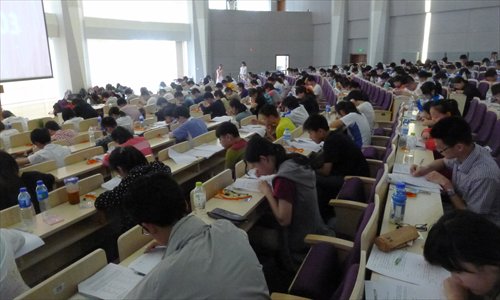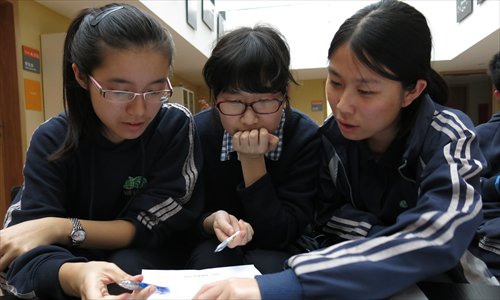The code crackers

Students at the National Linguistics Olympiad in 2013 Photo: Courtesy of the International Teenager Competition and Communication Center

Zhang Qingning, Zhong Anni and Du Jiameng get together to work on linguistics puzzles. Photo: Du Qiongfang/GT
Most people struggle to understand one language but there are some determined and talented young people in Shanghai who relish the challenge of a new language. Not just any language either - their particular delight is trying to understand the meanings of truly obscure languages like Saanich, which is now only spoken by about 20 old people living on the Saanich Peninsula of Vancouver Island in Canada.
Every Thursday afternoon, students from the Shanghai World Foreign Language Middle School get together to work out linguistics puzzles downloaded from linguistic research around the world.
The puzzles often list a few sentences translated from a rare language - like Saanich or Teop, which is spoken by about 5,000 people living in the north of Bougainville Island in Papua New Guinea. The students are then given other sentences in the language and set about translating these into English without dictionaries or other external assistance.
Sometimes the puzzles involve numbers replacing letters where the youngsters have to discover the sentences hidden in the codes. Or they are given a series of symbols, like those used in the Mayan calendars. Or they try to puzzle out meanings with just a few examples of pronunciation.
Gold medals
For these youngsters their extreme interest in languages has developed over the years. Most studied English and German or Spanish at school but, in March, they won the equivalent of several gold, silver and bronze medals at the National Linguistics Olympiad (NOL).
These first year senior high school students are members of the Crunchy Zoo team and battled their way for six hours at the Olympiad, translating excerpts from eight languages into Chinese. In the contest they worked on Sangho, the primary language of the Central African Republic; Rjng, which is spoken on Sumatra in Indonesia; Turkmen, which is spoken by 5 million people in Turkmenistan; Tondano, an Austronesian language spoken in the Tondano area of northeast Sulawesi in Indonesia; Iguta or Guta, a Kainji language of Nigeria; Welsh; Saanich; and Two-Cell Chinese Braille, an effective writing system used by the blind in China.
Training for the contest saw the six-member team studying more than 100 languages but they revel in what other students would regard as an excessive amount of homework and extra study. Zhang Qingning, the club captain and a runner-up at the Olympiad, explained that the more languages she studies the more precisely she can express herself. She is writing a treatise on how multi-language studies benefit writers.
Zhang had intended to become a lawyer but now she is expanding her studies to include more work in linguistics. For the Olympiad third place-getter, Zhong Anni, the contest was also a watershed. Working on Two-Cell Chinese Braille, she discovered the problems visually challenged people face and is now thinking about producing audio books for the blind.
Linguistics does not just attract those interested in languages and literature, but also students intending to major in science at university. Another prize winner Du Jiameng wants to study biology.
"When I was studying I found the process of discovering gene arrangement is very similar to the way we solve linguistics puzzles," Du said.
Sherlock Holmes
"I took part in the contest just out of interest and curiosity, not for any practical purpose. But I find decoding languages is like decoding the mysteries in Sherlock Holmes's stories which I read when I was very young and found fascinating," said Chen Run, a student from the Hangzhou Foreign Languages School.
The NOL is the tryout for the International Linguistics Olympiad (IOL) where students from all around the world compete to make sense of rare languages using logic and reasoning. "In fact, the contest is an intellectual game rather than a language contest," said Jiang Yuqin, the chairperson of the NOL and the director of the International Teenager Competition and Communication Center. She introduced the contest to China.
The Olympiad was started by linguists and mathematicians in Eastern European countries in the 1960s and recently more countries have become involved.
The first IOL was held in Bulgaria in 2003 and in Manchester in Britain last year 138 contestants representing 26 countries and regions took part. China has been sending teams to the IOL since 2012 and Beijing will host this year's contest between July 21 and 25 with contestants from at least 28 countries.
The contest is one of the recommended projects for recruitment listed by several leading universities in the US including MIT, Yale and Harvard.
At the 3rd NOL in Beijing some 900 participants from more than 30 schools across the nation took part and the best contestants will be selected for this year's IOL.
"The IOL focuses on actual languages, not artificial languages which feature in the computational linguistics competitions held in the North America," explained Lin Fanming, the coach of the NOL winning team.
"After students study linguistics, they realize that there are thousands of different languages in the world. Some languages are only spoken by a few people. Some are not used today but used to be popular. But all the languages express different cultures. The culture behind the language is interesting for these students - like the Inuit language that has different phrases and expressions to describe the color white, and Arabic, which has 200 words for a camel," Lin said.
Spurs interest
"The contest spurs interest in some of the dying languages and reminds people to treasure the cultures reflected by these languages. Even though a language is spoken by few people, it is always worth recording because of its culture. Like biological diversity, linguistics diversity is also worth preserving," Lin said.
Although the contest looks like it is about languages the IOL has little to do with the study of languages. "A language is a medium for different cultures. Students can learn about different cultures through linguistics. The competition is not aimed at testing language skills. Foreign students who live in multi-language environments cannot necessarily do better than students who live in single-language environments. Students study the rules, regulations and cultures behind the languages," said Jiang.
The competition also aims to improve the students' thinking and broaden their horizons. "When students come across a problem, they have to try different approaches and angles to solve it. They have to integrate knowledge with an expanded way of thinking. Their ways of thinking were stretched as they prepared for the contest and studied nearly 100 foreign languages in a short period of time. When they expanded their horizons, their thinking was also changed. That's why the top universities have found the contest a good method of selecting talent. We have found that students from economically advanced countries are more varied in their thinking. Their knowledge and experiences are richer and their comprehension is better," Jiang said.
"The competition is a perfect combination of mathematical logic and humanistic knowledge. Compared with foreign students, Chinese students have a narrower approach to problems. The fact that our students don't perform as well is not because we joined this competition later or that our students are not coached properly, but because they lack the ability to think comprehensively. A linguistics contest is not like other international science Olympiads where performance can be improved by coaching. A linguistics contest demands contestants apply 40 percent of their brain power in logic, 30 percent in practical application, 20 percent in understanding the cultural background and 10 percent in the knowledge of linguistics. It's not easy to coach students to perform better," she said.
Pure interest
Because this contest has nothing to do with the gaokao (the national college entrance examinations), the students enter this contest purely out of interest in problem solving. But linguistics does have practical applications.
"Whenever war breaks out, the countries involved use cipher codes to relay information and these are related to linguistics. The American World War II movie Windtalkers showed how the US army used Navajo, a native American language, as a code. We want to show students why there are so many languages in the world.
"People who think it is just an academic interest don't realize how linguistics can relate to a country's security."
The practical applications of linguistics now involve every aspect of people's daily lives. "The search engines Google and Baidu are practical applications of linguistics. There are also psycholinguistics, computational linguistics, forensic linguistics, and password linguistics which are widely used," Jiang said.